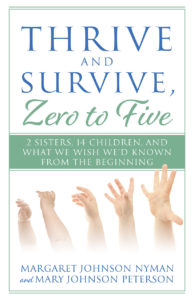Excerpt from THRIVE AND SURVIVE, ZERO TO FIVE
I (Mary) learned about eating issues with one-year-old Marta. As a baby, then a toddler, she was a picky eater to the max. She didn’t have an ounce of fat on her, because she refused to eat 90 percent of whatever I cooked. Though I tried every trick in the book to make food appealing to her, she just wouldn’t eat. Gut instinct told me it would be wrong to discipline her for lack of an appetite, especially since she was a sweet, compliant child in every other respect. But I didn’t know what to do.
Every Saturday morning I made Swedish pancakes for our family, and little Marta was willing to eat one of those. So I decided to make it my mission to produce Swedish pancakes every day of the week, just for her—breakfast, lunch, and dinner. Because she needed calories, I substituted cream for the milk and went heavy on the eggs. It didn’t bother me that she wanted to dip her pancakes into a puddle of syrup. Anything to get her to eat.
She ate pancakes every day during those many months, and eventually she began tasting other things too. Had I punished her for refusing to eat, I don’t believe it would have helped in any way. It certainly would have made her dread family mealtimes and probably would have damaged our relationship. Today Marta is a healthy twenty-six-year-old with a normal appetite. And though she eats virtually all foods, she has a special fondness for Swedish pancakes.
HOW NOT TO HAVE WHINE WITH EVERY MEAL
- Set attainable goals for meals.
- Serve foods your child likes.
- Dish up child-size portions.
- Keep mealtimes short and sweet.
- Encourage new foods without forcing.
- Praise a willingness to try new foods.
- Expect childlike behavior from your child.
- Never allow a whiner to ruin mealtime.

